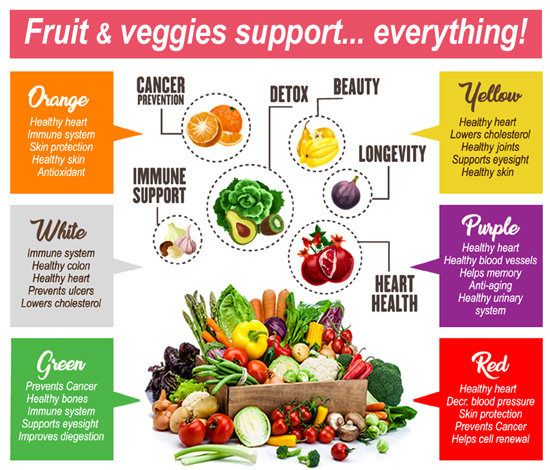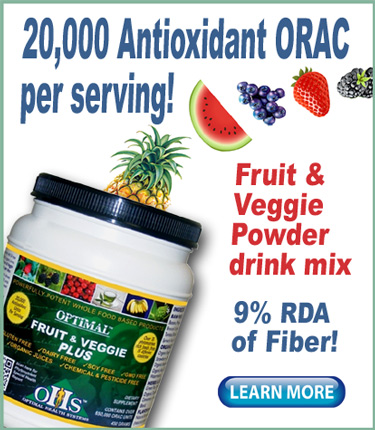If you’re one of the 41 percent of Americans who make a New Year’s resolution, you probably know that such resolutions are often difficult to keep. Especially health-related goals.
But they don’t all need to be difficult.
In fact, there’s one health resolution you can make that is easy to keep, yet will make a profound impact on your health: increasing your fruit and vegetable intake.
A 2019 tracking-survey by Strava, the producers of a popular fitness app, only 9% of the 800 million logged users were successful in keeping their resolution.
A similar, but more widely-publicized study by U.S. News & World Report found that 80% of new year resolutions failed by mid-February.
Two of the most common reasons attributed for resolution failure were lack of time and lack of resources.
Ironically, these are also two of the most common reasons given by people who fail to consume an adequate amount of fruits and vegetables.
Fortunately these two obstacles can be overcome easily with the use of nutritional supplements. By taking advantage of concentrated formulas, supplementation can reduce both the cost of fruit and vegetable nutrition and the time it takes to prepare them.
What is adequate intake?
According to the Dietary Guidelines published by the U.S. Centers for Disease Control & Prevention (CDC) American adults should consume 2–3 cup-equivalents of vegetables daily and 1.5–2 cup-equivalents of fruits each day.
The CDC advises these are just guidelines for an average person. Larger people, people with physically demanding jobs, and people who have aggressive exercise routines should consume more.
These recommendations can be considered the bare minimum. Most nutrition educators and coaches would say that research shows that official recommendations should be increased. For example, a 2019 study that tracked participants for 20 years found that people who upped their consumption to six servings of vegetables and three servings of fruit each day experienced less memory loss over time.
Americans not up to par
According to a 2019 survey by the CDC, only 12.3% of Americans met the fruit intake recommendation, while an even lower amount—10.0%—met the vegetable intake recommendation.
Even more astoundingly, a survery conducted in 2019 for FoodTracker.com foud that 25% of respondents had actually never eaten a vegetable at all!
To understand how this is possible, one has to recognize that giant swaths of the U.S. population live in “food deserts”—areas where fresh foods are not easily accessible.
It is also necessary to understand the modernization of the food industry.
Huge multi-national companies dominate the industry, and their marketing priority is processed foods. Processed foods represent a five-or-six fold increase in profit compared to fresh produce.
Think about it this way: When did you last see an ad for turnips, radishes or asparagus on t.v.?
Some fruit & veggie consumption stats
• Approximately 25% of Americans don’t eat vegetables at all, and those that do only include vegetables in about one-third of their meals.
• 72% of Americans acknowledge they should be eating more vegetables, while 67% say they feel guilty when they don’t include produce in a meal.
Why do Americans fail so dismally?
• 25% say produce rots before they can prepare it.
• 25% say vegetables are too expensive to buy.
• 22% say vegetables take too long to prepare.
• 20% say they don’t know how to cook vegetables.
Americans favorite vegetables
• Corn and potatoes tie for first place (91%).
• Carrots and Tomatoes tie for second place (89%).
• Green beans and onions tie for third place (87%).
Source: 2019 survey conducted by OnePoll.
The health consequences
The health consequences of low fruit and vegetable consumption is dire. While most people can obtain enough protein even from a diet high in processed foods, vitamins, minerals, fiber and antioxidants are sorely lacking. And as long as fruit and vegetables are not regularly consumed, a person cannot assuage the problem.
According to the CDC, a diet with adequate fruit and vegetable intake “supports healthy immune function and helps to prevent obesity, type 2 diabetes, cardiovascular diseases, and some cancers; having some of these conditions can predispose persons to more severe illness and death from COVID-19.”
Recent studies
Besides the CDC recommendations, the importance of fruit and veggie intake is evidenced by research that stretches back literally hundreds of years. Though early studies established generalized benefits, the technology available today pinpoint far more subtle aspects of fruit and vegetable benefits:
• A 2021 study published in Molecules provided details on how carotenoids and polyphnols from fruits and veggies balanced skin cell’s response to UV irradiation.
• A 2022 study published in Nutrients found eating vegetables lowered inflammation biomarkers regardless of physical activity.
• A 2021 study published in Clinical Nutrition found fruit and vegetable intake was inversely associated with perceived stress across the adult lifespan.
• A 2021 study published in The Journal of Nutrition found the nitrates in a single cup of leafy green vegetables per day “significantly” boosted muscle function.
Want to increase your intake of fruit and veggies, and receive the proven health benefits? Check out Optimal Fruit & Veggie Plus by Optimal Health Systems.
Each scoop of this potent powder contains 13 times more antioxidants than what the average American consumes each day. You’d have to consume several bowls of miscellaneous produce to accomplish this, so supplementing this way saves you both time and money!
Learn more by clicking the banner ad on this page.
– – –
Sources: Links to all studies provided in listings above.


